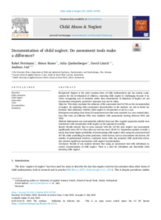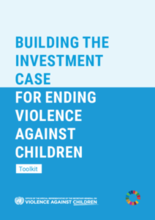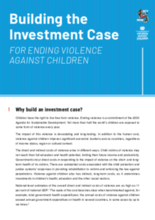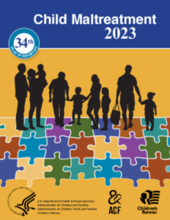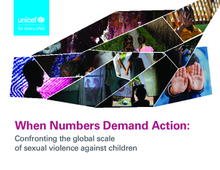Displaying 11 - 20 of 1089
This short film was produced by the Global Youth-Led Movement on Ending Violence Against Children for the launch of the World Health Organization’s first-ever report on the public health impact of corporal punishment of children (August 2025).

The Framework for Action is an interagency initiative, led by UNICEF, Save the Children and World Vision, driving global action behind efforts to strengthen child protection systems, mobilising the complex array of stakeholders at sub-national, national, regional and global levels to implement pledges and commitments to end violence against children.
Neglect is the most common form of child maltreatment and has serious consequences for the development of children. Assessing child neglect is challenging because it involves recognizing acts of omission rather than commissions. This study examines the influence of the assessment tool SAT-BL on the documentation of neglect.
The VACS Data Dashboard is a comprehensive online tool designed to provide easy access to data from the Violence Against Children and Youth Surveys (VACS) across more than 20 countries.
This toolkit, building on prior research, presents the economic rationale for investing in the prevention and response to violence against children, emphasizing that such spending should be seen as an investment rather than a cost. Part A outlines the societal and economic benefits of preventing violence, while Part B provides a step-by-step guide for practitioners to develop evidence-based investment cases to persuade governments to adopt integrated, cross-sectoral strategies.
This advocacy brief and video are underpinned by research confirming the high costs of violence against children to society, and the significant returns that could accrue from investments made in interventions to prevent and respond to violence against children. The research highlights the need for a paradigm shift, from viewing expenditure on the protection of children from violence as a cost to viewing it as an investment.
Child Maltreatment 2023 (the report) is the latest edition of the annual Child Maltreatment report series. The report is used by researchers, practitioners, and advocates throughout the world as a source for national child welfare data. Jurisdictions provide the data for this report via the National Child Abuse and Neglect Data System (NCANDS). NCANDS was established as a voluntary, national data collection and analysis program to make available state child abuse and neglect information. Since 1991, child welfare agencies in the 50 states, the Commonwealth of Puerto Rico, and the District of Columbia have collected and submitted data for NCANDS.
This report examines the global sexual abuse and exploitation of care leavers, highlighting how systemic failures, both within institutions and during the transition to independence, leave young people vulnerable to harm, including cross-border trafficking and online exploitation. It calls for urgent action to strengthen safeguarding, ensure comprehensive aftercare, and create survivor-centered justice systems to protect care leavers’ rights, dignity, and long-term wellbeing.
This high-level satellite event to the Global Ministerial Conference on Ending Violence Against Children took place on November 6, 2024, and brought together prominent speakers from across the world. The purpose of this event was to put a spotlight on the intersection between children’s care and violence against children. Watch the recordings of the event in English, Spanish or French.
This UNICEF publication presents the first-ever global and regional estimates of sexual violence against children. It narrates through numbers the tragic reality of sexual violence, amplifying victims’ voices.

